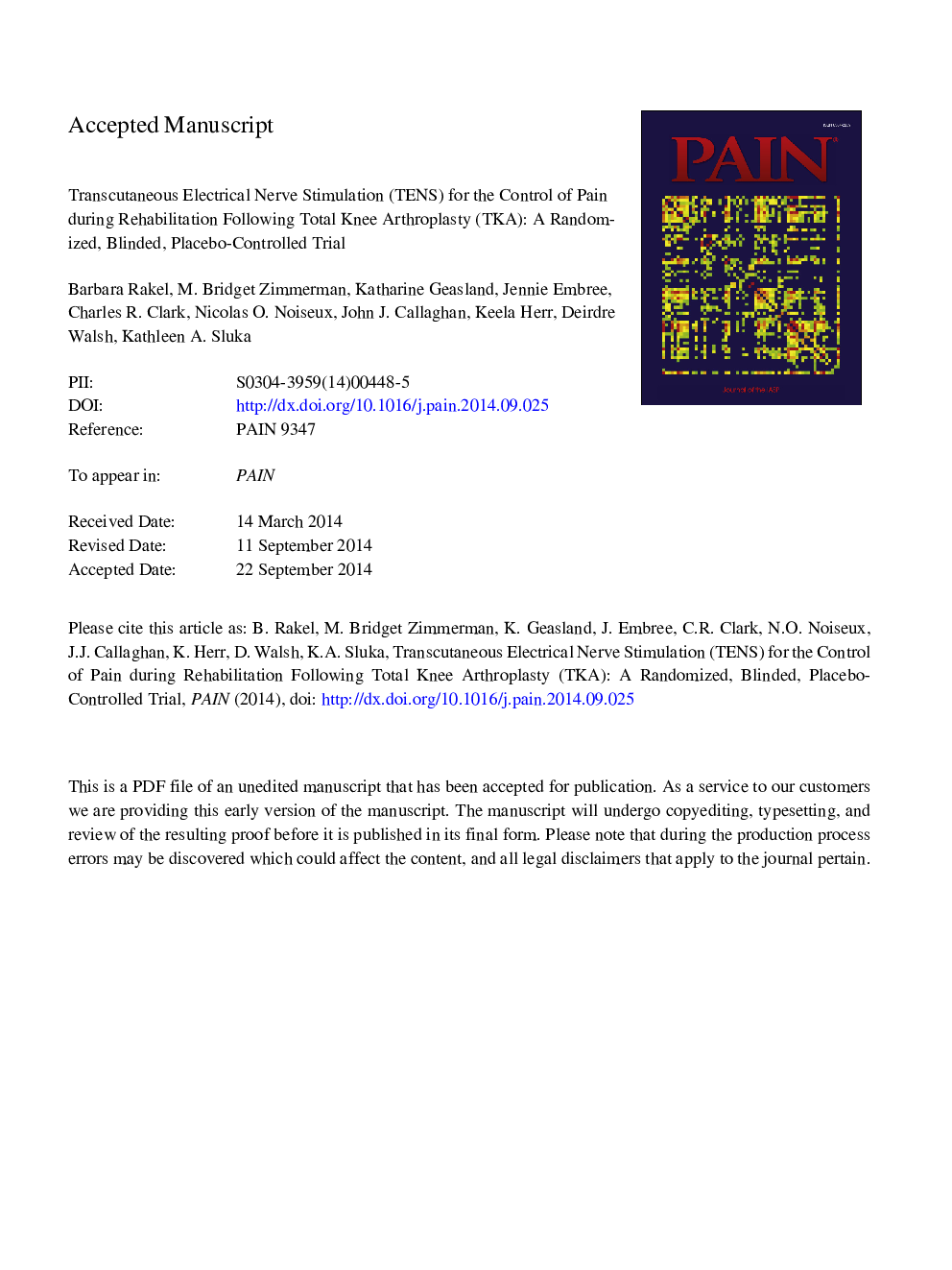| کد مقاله | کد نشریه | سال انتشار | مقاله انگلیسی | نسخه تمام متن |
|---|---|---|---|---|
| 7270334 | 1473237 | 2014 | 52 صفحه PDF | دانلود رایگان |
عنوان انگلیسی مقاله ISI
Transcutaneous electrical nerve stimulation for the control of pain during rehabilitation after total knee arthroplasty: A randomized, blinded, placebo-controlled trial
ترجمه فارسی عنوان
تحریک الکتریکی عضلانی پوستی برای کنترل درد در طی توانبخشی پس از آرتروپلاستی کامل زانو: یک کارآزمایی تصادفی، کور و کنترل دارونما
دانلود مقاله + سفارش ترجمه
دانلود مقاله ISI انگلیسی
رایگان برای ایرانیان
کلمات کلیدی
تحریک الکتریکی عصبی از طریق پوست، درد پس از عمل، آرتروپلاستی کامل زانو،
موضوعات مرتبط
علوم زیستی و بیوفناوری
علم عصب شناسی
علوم اعصاب سلولی و مولکولی
چکیده انگلیسی
This study evaluated the efficacy of transcutaneous electrical nerve stimulation (TENS) in reducing pain and hyperalgesia and increasing function after total knee arthroplasty (TKA). We hypothesized that participants using TENS during rehabilitation exercises would report significantly lower pain during range-of-motion (ROM) activity and fast walking but not at rest, would have less hyperalgesia, and would have better function than participants receiving placebo-TENS or standard care. We also hypothesized that change in ROM pain would differ based on psychological characteristics (trait anxiety, pain catastrophizing, and depression) and treatment group. This prospective, randomized study used intent-to-treat analyses in 317 participants after primary, unilateral TKA. Assessors, blinded to treatment allocation, measured pain, function (ROM and gait speed), and hyperalgesia (quantitative sensory tests) postoperatively and 6Â weeks after surgery. Analgesic intake, anxiety, depression, and pain catastrophizing were also assessed. TENS participants used it 1 to 2Â times per day at 42Â mA (on average) and had less pain postoperatively during active knee extension (PÂ =Â .019) and fast walking (PÂ =Â .006) than standard care participants. TENS and placebo-TENS were not significantly different. TENS participants who scored low on anxiety and pain catastrophizing had a greater reduction in ROM pain at 6Â weeks than those who scored high on these factors (PÂ =Â .002 and PÂ =Â .03). Both TENS and placebo-TENS participants had less postoperative mechanical hyperalgesia (PÂ =Â .03-.01) than standard care participants. Supplementing pharmacologic analgesia with TENS during rehabilitation exercises reduces movement pain postoperatively, but a placebo influence exists and the effect is gone by 6Â weeks. Patients with low anxiety and pain catastrophizing may benefit most from TENS.
ناشر
Database: Elsevier - ScienceDirect (ساینس دایرکت)
Journal: PAIN® - Volume 155, Issue 12, December 2014, Pages 2599-2611
Journal: PAIN® - Volume 155, Issue 12, December 2014, Pages 2599-2611
نویسندگان
Barbara A. Rakel, M. Bridget Zimmerman, Katharine Geasland, Jennie Embree, Charles R. Clark, Nicolas O. Noiseux, John J. Callaghan, Keela Herr, Deirdre Walsh, Kathleen A. Sluka,
